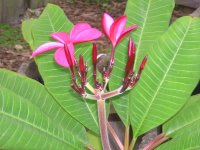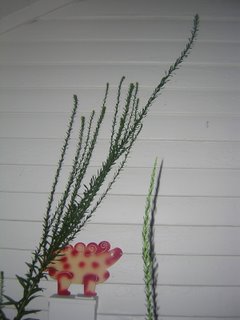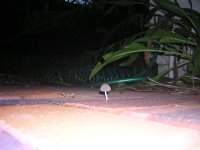 My old familiar friend, crab grass (Digitaria ischaemum ), lurching out its rhyzomed stalk. I love this plant, the very symbol of natural tenacity. It is loathed by lawn fanatics world wide for its fleshy invasive habits. It crowds out the gentle stands of soft bluegrass, undermining their delicate roots at the same time. One company has estimated that 80% of all invasive grasses invading manicured lawns across the country is this very species, the smooth crab grass. You've seen it erupt from an unlikely sidewalk in mid-town Manhattan or creep out over the edge of the asphalt where standing water had soaked the day before. It sends out shoots from piles of crushed stone and will grow right in the middle of your son's summer sandbox. It only needs the slightest toehold to get started. That, and a splash of water, and a rapid unfolding, a building of cells. Acids and bases performing that magical dance that builds cells that look like cells that were built before and makes structures that look like structures of other places and other times. Crab grass (Digitaria ischaemum) is named in the first place because its pattern persists. Fantastically successful by all accounts. This one made an amazing leap from the back alley where its parent cluster spawned it before dying last year or the year before, and then it rode one of these bricks that was put in place in front of my eyes just over six weeks ago, with fresh sterile sand. I was filled with a strange sort of joy and surprise when I found it growing here this morning. The shape of the stalk, the curve of the leaf, the clumsy sprawling disposition, it reminded me of thoughts I'd had before, of things that had passed before my eyes; it's form familiar, comfortably so. You have to reach down below a crab grass plant and grasp it at the root stalk to remove it, which is near impossible to do with human fingers in a pinched space like this one between the bricks. If the root remains, more grass will grow. When the owner of this xeriscaped plot, who himself laid these bricks so many weeks ago unaware of the planting he'd done of this species, told me about how to care for the yard his rule of thumb was to "remove everything that looks like grass." I have done so with care thus far,
My old familiar friend, crab grass (Digitaria ischaemum ), lurching out its rhyzomed stalk. I love this plant, the very symbol of natural tenacity. It is loathed by lawn fanatics world wide for its fleshy invasive habits. It crowds out the gentle stands of soft bluegrass, undermining their delicate roots at the same time. One company has estimated that 80% of all invasive grasses invading manicured lawns across the country is this very species, the smooth crab grass. You've seen it erupt from an unlikely sidewalk in mid-town Manhattan or creep out over the edge of the asphalt where standing water had soaked the day before. It sends out shoots from piles of crushed stone and will grow right in the middle of your son's summer sandbox. It only needs the slightest toehold to get started. That, and a splash of water, and a rapid unfolding, a building of cells. Acids and bases performing that magical dance that builds cells that look like cells that were built before and makes structures that look like structures of other places and other times. Crab grass (Digitaria ischaemum) is named in the first place because its pattern persists. Fantastically successful by all accounts. This one made an amazing leap from the back alley where its parent cluster spawned it before dying last year or the year before, and then it rode one of these bricks that was put in place in front of my eyes just over six weeks ago, with fresh sterile sand. I was filled with a strange sort of joy and surprise when I found it growing here this morning. The shape of the stalk, the curve of the leaf, the clumsy sprawling disposition, it reminded me of thoughts I'd had before, of things that had passed before my eyes; it's form familiar, comfortably so. You have to reach down below a crab grass plant and grasp it at the root stalk to remove it, which is near impossible to do with human fingers in a pinched space like this one between the bricks. If the root remains, more grass will grow. When the owner of this xeriscaped plot, who himself laid these bricks so many weeks ago unaware of the planting he'd done of this species, told me about how to care for the yard his rule of thumb was to "remove everything that looks like grass." I have done so with care thus far,  but this one I'm leaving for now. It means too much to me.
but this one I'm leaving for now. It means too much to me.On the anniversary of that horrible day a half decade ago the images of the lost architecture are everywhere. I consider myself blessed that I no longer watch television. But even in just reading the newspaper, there it is, again and again. And on its anniversary those uncivil bulldogs, Cheney and Rice, stand in front of cameras and recite the same lies that have been recited from the very beginning. They have figured out the psyche of the American electorate: Less than a majority is paying attention and the rest of everyone likes a good effort. That is what they keep presenting. Not the truth, not the facts, not the real world in which informed citizens live, but that they are convinced of themselves and the good effort they are making. And people seem to keep soaking it up. You can't blame a guy for trying, they say as they re-elect their doom. A good effort is being successfully presented. A false sense of order and purpose. They lie and more of our children die. The Enlightenment succeeded in producing a democractic aristocracy rooted in a free market, but it had aimed to over come aristocracy itself. This goal waits, like crab grass seed, for the right combination of water and sunlight.

